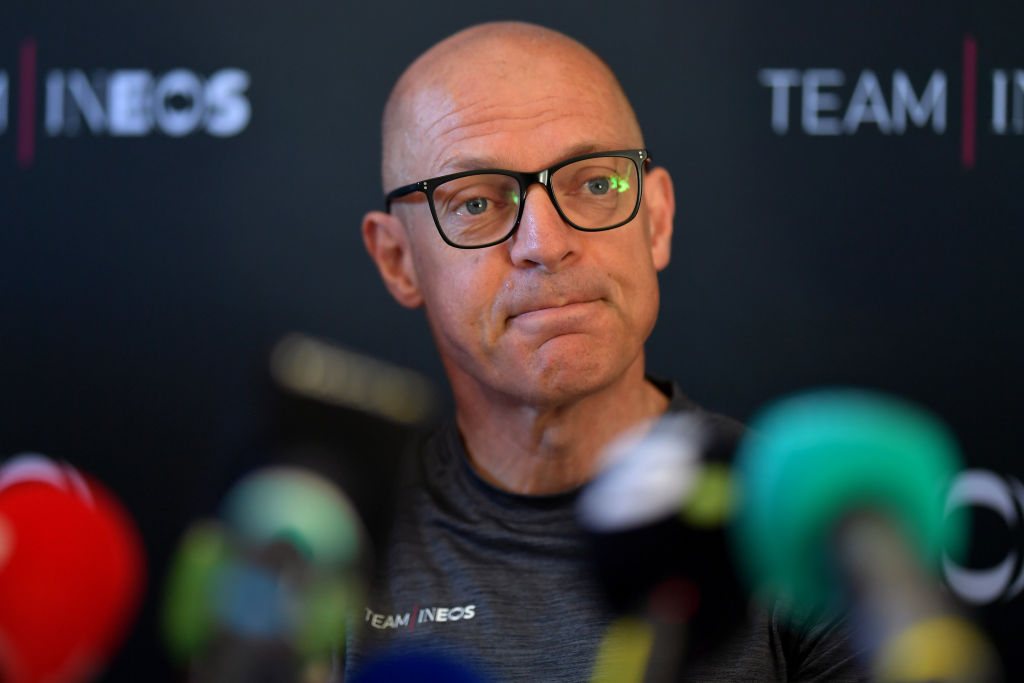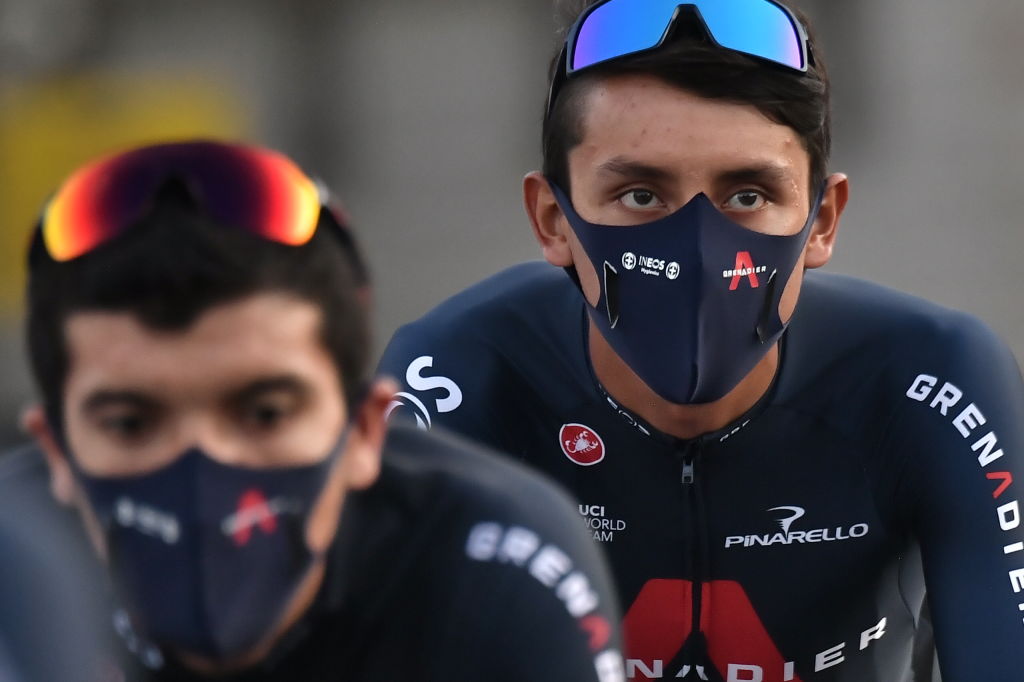Dave Brailsford: We're here to win the Tour de France
Ineos Grenadiers manager accepts COVID-19 cases could mean the Tour doesn't reach Paris

The Ineos Grenadiers team start a new chapter of their Tour de France history, with Egan Bernal named the sole team leader and Chris Froome and Geraint Thomas absent. Yet for team manager Dave Brailsford, the goal remains the same: overall victory and another yellow jersey in Paris, even if the threat of the COVID-19 pandemic means the race might not last three weeks and make it to Paris.
“We’re here to win the Tour de France,” Brailsford said at the Ineos Grenadiers video press conference on Friday.
“We’ve won it several times over the years and were ambitious, we always have been. And that hasn’t changed at all. We're here with a lot of ambition, a lot of energy and a lot of excitement. We’re looking forward to getting stuck into the race.”
The death of senior directeur sportif Nicolas Portal in the spring was a huge blow for Ineos Grenadiers. Gabriele Rasch will take that role but Brailsford is hoping the whole team's Tour de France winning experiences can make up for the loss of Portal’s unique leadership from the team car.
“We’ve won the race more than anyone else in this race,” he pointed out, also firing a blow across the bows of major rival Jumbo-Visma.
“We have riders in our team who won more Grand Tours than other teams, so our collective knowledge on how to win in this team is greater than anywhere else. We're going to work with a collective approach and share each other's knowledge for the benefit of the team.”
Brailsford spun the absence of Froome and Thomas into a positive when naming the Ineos Grenadiers line-up for Tour de France, announcing that the Welshman will target the Giro d’Italia, while Froome will target the Vuelta a España before moving to Israel Start-Up Nation for 2021.
Get The Leadout Newsletter
The latest race content, interviews, features, reviews and expert buying guides, direct to your inbox!
He had little desire to look back at their previous Tour de France success together.
“I don't think you look backward. We’ve had a lot of success over the years and learnt a lot together, we had tremendous experience together but you always look forward,” he argued.
“We have to focus on the team we have here, I’m very excited about the team we have. It's a young team, mixed with a blend of very of experienced support riders. I think it’s an exciting blend. While it’s been a fantastic journey and we’ll focus on Geriant and Chris in the rest of the season, for now everything is focused on here and we’re very confident in the team we have here.”
Richard Carapaz was brought into the Tour de France team to support Bernal. He won the 2019 Giro d’Italia but Brailsford made it clear Bernal is the designated team leader for the next three weeks. There is no real plan B.
“I think Egan deserves to be the out and out leader, he won last year and is a brilliant rider,” Brailsford said.
“He’s a great talent and has matured beyond his years, so we'll start the race very much with Egan as the outright leader of the team and fully support him.”
The spectre of COVID-19 cases at the Tour de France

The spectre of COVID-19 cases at the Tour de France and the risk of the race sparking a spread of the virus amongst the wider French public is hanging over the race like the Sword of Damocles.
The number of new daily COVID-19 cases in France went over 5,000 on Thursday and the Alpes-Maritimes department was declared a red zone on Thursday, with the virus actively spreading.
Crowds were limited to just a few hundred at the team presentation on Thursday and will be controlled at stage starts and finishes and on the mountains of the race. Any roadside fans will have to wear a face mask and teams have to follow a strict medical protocol that includes riders sleeping in single rooms, wearing masks on the podium.
There are doubts about if the race can go on but Brailsford believes it should.
“Nobody knows if we’ll reach Paris, that’s the truth,” he conceded. “But we’re going to race as if it’s a three-week race, a complete Tour. If things change, then they change.
“In broader terms, not only the Tour de France, I think there’s debate about going back to work and school, and trying to return to normal as much as possible. I think sport plays a key part in that.
“There are lots of measures and so if people take the precautions, and comply with the protocols, we can minimize risk and quit significantly.
“I think ASO deserves a lot of credit, they've done everything possible to make the event work. Everyone wants the event to happen but we also have to take a commonsense approach; if we get to a point where it's detrimental or too much of a risk to riders, teams, and the public in general, then people need to take that on board.
“It’s important for sport (the race goes ahead), it's important for society and it's important in general but equally we need to be responsible with our approach.”
Recently a number of cases have raised concerns about false positives.
A special investigation by Laura Weislo for Cyclingnews highlighted how they can occur and why follow-up tests are vital to eliminating false positives.
Under the UCI and Tour de France protocols, riders and staff in the team bubbles have to leave the race if they test positive, even if they are a major contender or even in the leader’s yellow jersey.
Riders and team staff members were tested for COVID-19 six and three days before the start of the Tour de France. Four members of the Lotto Soudal team were sent home on Thursday after a mechanic and a soigneur tested ‘non-negative.’
The ever-moving nature of a Grand Tour racing means there is little time for secondary testing to confirm cases and eliminate false positives.
Brailsford is very aware and concerned about the implications.
“False positives are an issue and a challenge for all of us. But if we take a step back and look at the testing that is taking place, and the percentages of getting a false positive or a false negative, it’s inevitable that they’re going to happen,” he said.
”Our challenge is the time scale. If we want to act quickly, then we don’t really have the time to double-check or wait 24-48 hours for another test to verify a false positive.
We have to act quickly. That’s not the best scenario but it’s realistic. We should try to deal with it in the best possible way and see if there’s a way to speed up the secondary test to see if there’s a false positive or not. We’re not there yet but I’m sure we’ll get there pretty soon.”

Stephen is one of the most experienced member of the Cyclingnews team, having reported on professional cycling since 1994. He has been Head of News at Cyclingnews since 2022, before which he held the position of European editor since 2012 and previously worked for Reuters, Shift Active Media, and CyclingWeekly, among other publications.